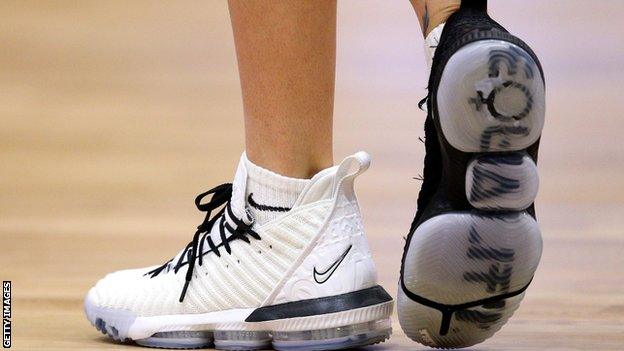It's time to build 'back fairer' for women in sport - Welsh Sports Association chief Ward
- Published

Victoria Ward wants equality between women's and men's sportspeople in Wales
A leading figure in Welsh sport wants sportswomen to gain parity with their male counterparts as the coronavirus pandemic eases.
The call has come from Welsh Sports Association (WSA) chief executive Victoria Ward.
"We hear terms like 'unprecedented' and 'building back better' all the time," said Ward.
"But for me we really need to take the opportunity in sport to build back fairer."
Ward told BBC Radio Wales the impact of Covid-19 on sport: "Really shone a spotlight on the inequalities of sport and I think women have had a particularly tough year.
"Group exercise is one of the most popular activities amongst women and we've only had four months of opening up facilities in the last 12 months, with groups being able to be narrowed down to just 15 in a group.
"That also causes us real problems with the number of women that can get inside.
"When you look at sports such as netball, which we may not have considered as being a contact sport before, more than 10,000 women and girls playing the sport every week in sports centres haven't been able to play one game in the last year."
Ward also highlighted the plight of Wales rugby union flanker Alisha Butchers, who crowd-funded to pay for an operation after being injured in Bristol Bears training.
"It's ridiculous that we can hear of a rugby player such as Alisha Butchers having to crowd-fund to get an operation for an injury," said Ward.
"You'd never see that of [Wales captain] Alun Wyn (Jones), you know, but she is also a professional rugby player, playing for Bristol Bears and it's shameful, frankly, that this is still happening."
Ward says Sport Wales, which is responsible for developing and promoting sport and physical activity in Wales, has "done a really great job and so have the governing bodies in the last few years" in trying to balance out the widely-acknowledged sports participation gap between boys and girls.
"But yes, there is still more of a risk of young girls, teenagers, dropping off from sport than there are with boys," said Ward.
"There's still more of a culture for boys than there is for girls and part of that is the business of being able to see it to be it.
"So when you then look at our sort of professional sport, it's mostly men you'll see on the television for instance.
"It's really great to see that the BBC now have come out recently to announce their investment in the Women's Super League in terms of broadcasting that, worth around £7m or £8m.
"But when you look at the Premier League of football, £232m was the last television deal so you can see there's still a huge disparity."
Ward added: "There's still a huge amount to be done and that is the responsibility of the media and the governing bodies to make sure that there is more equality in the way these sports are profiled."